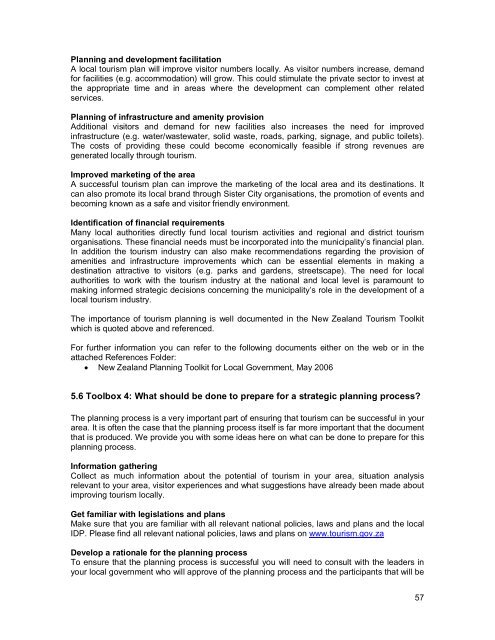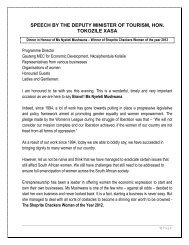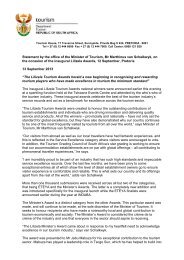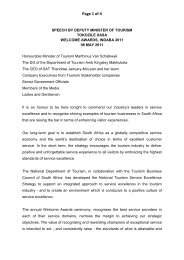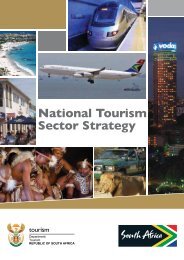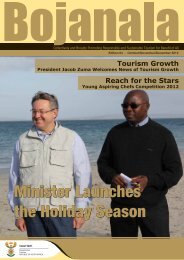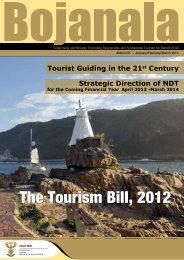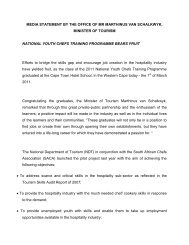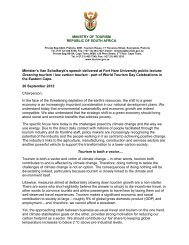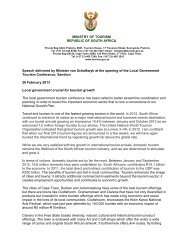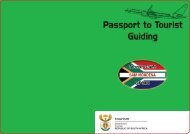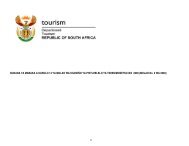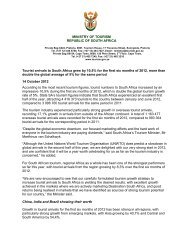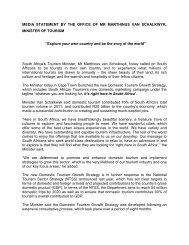The South African Tourism Planning Toolkit - Department of Tourism
The South African Tourism Planning Toolkit - Department of Tourism
The South African Tourism Planning Toolkit - Department of Tourism
Create successful ePaper yourself
Turn your PDF publications into a flip-book with our unique Google optimized e-Paper software.
<strong>Planning</strong> and development facilitationA local tourism plan will improve visitor numbers locally. As visitor numbers increase, demandfor facilities (e.g. accommodation) will grow. This could stimulate the private sector to invest atthe appropriate time and in areas where the development can complement other relatedservices.<strong>Planning</strong> <strong>of</strong> infrastructure and amenity provisionAdditional visitors and demand for new facilities also increases the need for improvedinfrastructure (e.g. water/wastewater, solid waste, roads, parking, signage, and public toilets).<strong>The</strong> costs <strong>of</strong> providing these could become economically feasible if strong revenues aregenerated locally through tourism.Improved marketing <strong>of</strong> the areaA successful tourism plan can improve the marketing <strong>of</strong> the local area and its destinations. Itcan also promote its local brand through Sister City organisations, the promotion <strong>of</strong> events andbecoming known as a safe and visitor friendly environment.Identification <strong>of</strong> financial requirementsMany local authorities directly fund local tourism activities and regional and district tourismorganisations. <strong>The</strong>se financial needs must be incorporated into the municipality’s financial plan.In addition the tourism industry can also make recommendations regarding the provision <strong>of</strong>amenities and infrastructure improvements which can be essential elements in making adestination attractive to visitors (e.g. parks and gardens, streetscape). <strong>The</strong> need for localauthorities to work with the tourism industry at the national and local level is paramount tomaking informed strategic decisions concerning the municipality’s role in the development <strong>of</strong> alocal tourism industry.<strong>The</strong> importance <strong>of</strong> tourism planning is well documented in the New Zealand <strong>Tourism</strong> <strong>Toolkit</strong>which is quoted above and referenced.For further information you can refer to the following documents either on the web or in theattached References Folder: New Zealand <strong>Planning</strong> <strong>Toolkit</strong> for Local Government, May 20065.6 Toolbox 4: What should be done to prepare for a strategic planning process?<strong>The</strong> planning process is a very important part <strong>of</strong> ensuring that tourism can be successful in yourarea. It is <strong>of</strong>ten the case that the planning process itself is far more important that the documentthat is produced. We provide you with some ideas here on what can be done to prepare for thisplanning process.Information gatheringCollect as much information about the potential <strong>of</strong> tourism in your area, situation analysisrelevant to your area, visitor experiences and what suggestions have already been made aboutimproving tourism locally.Get familiar with legislations and plansMake sure that you are familiar with all relevant national policies, laws and plans and the localIDP. Please find all relevant national policies, laws and plans on www.tourism.gov.zaDevelop a rationale for the planning processTo ensure that the planning process is successful you will need to consult with the leaders inyour local government who will approve <strong>of</strong> the planning process and the participants that will be57


